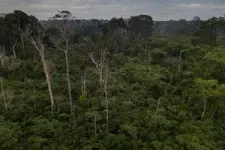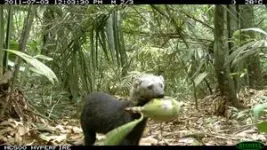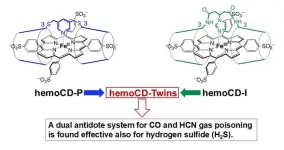(Press-News.org)
Fast-growing and small-seeded tree species are dominating Brazilian forests in regions with high levels of deforestation and degradation, a new study shows.
This has potential implications for the ecosystem services these forests provide, including the ability of these ‘disturbed’ forests to absorb and store carbon. This is because these “winning” species grow fast but die young, as their stems and branches are far less dense than the slow growing tree species they replace.
Wildlife species adapted to consuming and dispersing the large seeds of tree species that are being lost in human-modified landscapes may also be affected by these shifts.
Authors of the study, published today in Nature Ecology and Evolution, say their findings highlight the urgent need to conserve and restore tropical forests, prevent degradation, and implement measures to protect and boost populations of the large-bodied birds like toucans and mammals such as spider monkeys that disperse the seeds of “losing” slow-growing large-seeded tree species.
An international team of researchers examined a unique dataset of more than 1,200 tropical tree species over more than 270 forest plots across six regions of Brazilian Amazon and Atlantic forests that have been altered by people through activities such as deforestation and local disturbances like logging, hunting and burning.
The researchers looked at the overall structure of the landscapes surrounding each forest plot and, using multiple statistical models, they were able to identify the causal effects of habitat loss, fragmentation and local degradation on the composition of forests, as well as identifying the attributes of so-called “winners” and “losers” species.
“We found that the tree species dominating landscapes with high forest cover tend to have dense wood and large seeds, which are primarily dispersed by medium to large-bodied animals typical of Brazil’s rainforests,” said Bruno X. Pinho, first author of the study who conducted most of the research while at the University of Montpellier (now at the University of Bern). “In contrast, in highly deforested landscapes, where remaining forests face additional human disturbances, these tree species are losing out to so-called ‘opportunistic’ species, which have softer wood and smaller seeds consumed by small, mobile, disturbance-adapted birds and bats. These species typically grow faster and have greater dispersal capacity”.
The researchers found this was happening despite differing geography, climate and land-use contexts.
This study highlights the urgent need to strengthening the conservation and restoration of tropical forests to preserve these vital ecosystems.
“The strong influence of forest degradation in some Amazonian regions demonstrates the importance of going beyond tacking deforestation and also combating forest disturbances, such as selective logging and fires,” said Senior Investigator Professor Jos Barlow, of Lancaster University.
Tropical forests constitute the most important reservoir of terrestrial biodiversity. They play a major role in absorbing greenhouse gasses and provide essential ecosystem services. Yet they are victims of rapid deforestation and fragmentation, with the loss of 3 to 6 million hectares per year over the last two decades. A large part of today's tropical forests are therefore found in landscapes modified by humans and exposed to local disturbances.
“These functional replacements have serious implications that urgently need to be quantified. They suggest possible deteriorations of essential processes of these ecosystems and their contributions to human populations, in particular through changes in carbon stocks – but also in fauna-flora interactions and forest regeneration,” explains Felipe Melo, second author of the study and researcher at the Federal University of Pernambuco in Brazil (now at Nottingham Trent University).
“There is broad consensus on the negative impact of habitat loss on biodiversity, but the independent effects of landscape fragmentation and local disturbance remain less well understood, in part because of the difficulty in disentangling cause-and-effect relationships on the one hand and non-causal associations on the other,” explains David Bauman, of the French National Research Institute for Sustainable Development (IRD) and co-author of the study.
The study also helps address these questions, and shows that policies should focus on preserving and enhancing forest cover and preventing degradation, and can worry less about how the remaining forests are distributed across the landscape.
The study, which received funding support from the UKRI National Environment Research Council, is outlined in the paper ‘Winner-loser plant trait replacements in human-modified tropical forests’ published in Nature Ecology and Evolution.
END
You may not be familiar with hydrogen sulfide, a colorless gas that smells like rotten eggs, and is produced naturally from decaying matter. However, this gas is lethal to breathe in, and hydrogen sulfide present in high concentrations can cause death very rapidly. Its relative density is also greater than air, causing it to accumulate at lower altitudes and posing an enormous threat to workers at sites, such as manholes, sewage systems and mining operations.
Why is hydrogen sulfide so dangerous? It binds strongly to the heme-containing cytochrome c oxidase ...
IMPERIAL COLLEGE LONDON PRESS RELEASE
Under STRICT EMBARGO until:
10 December 2024
10:00 UK TIME / 05:00 ET
Peer-reviewed / Observational study / People
Trial shows no significant difference in performance between visually impaired participants using new device and sighted participants using only natural vision.
Participants performed significantly better using new device than with currently available vibration technology.
The new device is believed to be the most advanced navigation tech of ...
Three leading climate scientists have combined insights from 10 global climate models and, with the help of artificial intelligence (AI), conclude that regional warming thresholds are likely to be reached faster than previously estimated.
The study, published in Environmental Research Letters by IOP Publishing, projects that most land regions as defined by the Intergovernmental Panel on Climate Change (IPCC) will likely surpass the critical 1.5°C threshold by 2040 or earlier. Similarly, several regions are on track to exceed the 3.0°C threshold ...
The FRONTIERS Science Journalism in Residency Programme has selected ten science journalists to participate in its second round of residencies. The chosen candidates—Marta Abbà, Rina Caballar, Danielle Fleming, Will Grimond, Giorgia Guglielmi, Suvi Jaakkola, Tim Kalvelage, Thomas Reintjes, Senne Starckx, and Meera Subramanian—will spend three to five months in residency at European research institutions, working on their journalistic projects.
The residencies, hosted by institutions in Austria, Denmark, Germany, Italy, the Netherlands, Norway, Spain and the United Kingdom, offer a unique opportunity ...
AUSTIN, TX, December 10, 2024 – Wildfires in California are intensifying due to warmer temperatures and dry vegetation – putting more residents at risk of experiencing costly damages or losing their homes. Marginalized populations (lower income, elderly, and the disabled) often suffer the most and, according to a new study, may receive less economic and emergency assistance compared to wealthy residents.
A detailed analysis of more than 500 California wildfire incidents from 2015 to 2022 by University at Buffalo scientists shows that disaster recovery resources in California favor people living in wealthy communities over disadvantaged ...
New insights into the behaviour of aerosols from cooking emissions and sea spray reveal that particles may take up more water than previously thought, potentially changing how long the particles remain in the atmosphere.
Research led by the University of Birmingham found pollutants that form nanostructures could absorb substantially more water than simple models have previously suggested. Taking on water means the droplets become heavier and will eventually be removed from the atmosphere when they fall as rain.
The team, also involving researchers ...
A newly developed approach can precisely produce four-stranded β-sheets through metal–peptide coordination, report researchers from Institute of Science Tokyo. Their innovative methodology overcomes long-standing challenges in controlled β-sheet formation, including fibril aggregation and uncontrolled isomeric variation in the final product. This breakthrough could advance the study and application of β-sheets in biotechnology and nanotechnology.
In addition to the natural sequence of amino acids that makes up a protein, their three-dimensional arrangement in space is also critical to their function. For ...
A new paper in the Journal of Public Health, published by Oxford University Press, finds that household income in early childhood is a stronger and more consistent predictor for several major health-related problems for 17-year-olds than growing up in a poor neighborhood. The neighborhood was a slightly stronger predictor for obesity only.
The Index of Multiple Deprivation, which assesses neighborhoods in the United Kingdom according to factors including unemployment, low levels of education, crime, and barriers ...
LEIDEN, Netherlands, 10 December 2024 – In a wide-ranging Genomic Press Interview, eminent neuroscientist Dr. Edo Ronald (Ron) de Kloet reveals crucial insights into how stress hormones can shift from protecting to potentially damaging the brain, a discovery that has transformed our understanding of stress-related mental disorders and opened new therapeutic pathways.
Dr. de Kloet, Professor Emeritus at Leiden University Medical Centre and an Academy Professor of the Royal Netherlands Academy ...
Quitline coaching over the phone helped almost half of young people who vape ditch the habit, potentially improving their health and decreasing the chances they’ll transition to cigarettes, according to a new study.
The finding is promising and provides critical evidence about vaping cessation, an area with limited research to date, said Liz Klein, a researcher at The Ohio State University College of Public Health and co-author of the study, which appears in the American Journal of Preventive Medicine today (Dec. 10, 2024).
“This study provides hope that young adult ...






